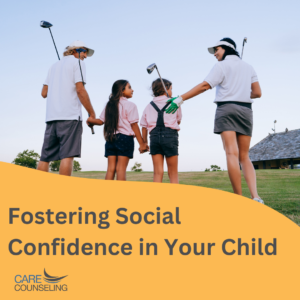Empowering Your Child to Handle Peer Pressure
 Growing up in a social world, children inevitably encounter peer pressure—a force that can sway decisions and influence behaviors. As a parent, your role is pivotal in helping your child navigate these social challenges and develop the resilience and confidence needed to make independent choices.
Growing up in a social world, children inevitably encounter peer pressure—a force that can sway decisions and influence behaviors. As a parent, your role is pivotal in helping your child navigate these social challenges and develop the resilience and confidence needed to make independent choices.
Understanding Peer Pressure
Peer pressure is the influence that peers exert on an individual’s thoughts, actions, and decisions. While not all peer influence is negative, it’s important to recognize when it begins to undermine your child’s autonomy and values. Open communication and fostering social confidence are key components in helping your child manage peer pressure effectively.
- Open Dialogue and Active Listening
Encourage open communication by creating an environment where your child feels comfortable discussing their experiences, concerns, and interactions with friends. Practice active listening, offering your full attention and validating their emotions. When they feel heard and understood, they are more likely to turn to you for guidance.
- Teach Assertiveness and Communication Skills
Empower your child with the tools to express their opinions and boundaries confidently. Teach them assertiveness skills, such as using “I” statements and expressing their thoughts respectfully. By practicing effective communication, they can navigate peer pressure scenarios without feeling coerced or overwhelmed.
- Explore Individual Interests and Passions
Help your child develop a strong sense of self by encouraging them to explore their interests and passions. When they are confident in their identity and values, they are less likely to be swayed by external pressures. Engaging in activities they genuinely enjoy boosts self-esteem and creates a foundation for authentic social connections.
- Role-Playing and Decision-Making Scenarios
Use role-playing exercises to help your child practice responding to various peer pressure situations. Create scenarios where they might encounter pressure to conform to certain behaviors or beliefs. By rehearsing these situations, your child can build their confidence and develop strategies to handle real-life encounters.
- Promote Critical Thinking
Encourage your child to think critically about the choices they make and the potential consequences. Discuss scenarios and ask questions that prompt them to evaluate the impact of their decisions on their well-being, relationships, and goals. Strengthening their critical thinking skills enables them to make informed choices aligned with their values.
- Provide Real-Life Examples
Share your own experiences with peer pressure from your childhood or adolescence. Highlight instances when you made decisions that reflected your values, even in the face of pressure. These personal stories can serve as relatable examples that illustrate the importance of staying true to oneself.
- Encourage a Supportive Friend Circle
Help your child cultivate friendships with peers who share their values and respect their individuality. Encourage them to surround themselves with friends who uplift and support them rather than encouraging negative behaviors. A supportive friend circle provides a safety net and reduces the impact of negative peer pressure.
- Celebrate Independence
Acknowledge and celebrate your child’s efforts to assert their independence and make their own choices. Reinforce the idea that you trust their judgment and value their ability to think for themselves. This positive reinforcement boosts their confidence and encourages them to continue making empowered decisions.
- Practice Problem-Solving
Involve your child in discussions about how to handle different peer pressure scenarios. Brainstorm together to develop creative strategies for saying no, changing the subject, or removing themselves from uncomfortable situations. Problem-solving skills equip them with practical tools to navigate challenges confidently.
- Build Resilience through Mistakes
Encourage your child to view mistakes as learning opportunities rather than failures. When they encounter instances where peer pressure led them astray, guide them in reflecting on what they learned from the experience. Building resilience through mistakes empowers them to grow and make better decisions in the future.
Peer pressure is a common part of growing up, but with the right guidance and support, your child can develop the skills to handle it with confidence. By fostering open communication, teaching assertiveness, promoting critical thinking, and encouraging a strong sense of self, you equip your child to make decisions that align with their values and aspirations. Ultimately, the goal is to help them become resilient, socially confident individuals who can navigate the complexities of peer interactions while staying true to who they are.



























